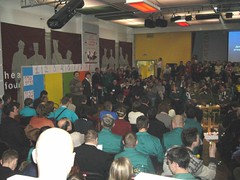Cambodian Street Kids in Open Space
Singapore-based Nigel Seys-Phillips, reported on the OSLIST on his contribution to a World Bank Asian initiative to connect with marginalized people:
…an amazing meeting in Phnom Penh, the capital of Cambodia, with some 150 street children from the horrendous circumstances of working for a living on the Phnom Penh city garbage dump – a literal mountain of fetid rubbish where garbage trucks arrive every few minutes to dump their waste directly onto this pile. The children made a living scrabbling for anything sellable the moment the back was opened, running in front of the bulldozer set to plough it down. Plastic, material, glass, food – anything sellable that might make them up to US$1 per day if they were truly lucky.
…Taken in by an astounding NGO “Pour Un Sourire D’Enfant” they now work at school six days a week. They are fed three simple nutritious meals a day, given uniforms and books, and educated towards a career and a productive life.
…We tackled the theme: “A better future for us – the Issues and Opportunities†And within the two days allowed we posted 110 topics. We reviewed, discussed and documented 92 of them and prioritized to 10, for which we created action points.
…these are street children from approximately 12-18 years old, but major topics prioritized included:
- Corruption and how to reduce it in Cambodia
- How to develop the economy in Cambodia to give us greater work opportunities
- How to export more products made in Cambodia
- How to limit illegal immigration so Cambodians aren’t disadvantaged
- How to use the results of the Khmer Rouge trials to benefit the people of Cambodia
These, and the way the children came at them, are a great tribute to the power of Open Space and its ability to genuinely achieve openness and safety for those who would otherwise not have a voice.
The World Bank OST “road show†continues to Mongolia, Laos, Timor, Indonesia, Vietnam, Singapore, Philippines and Thailand, and we hope to be able to train others to take the programme deeper into these countries.
A hearty thanks to Nigel for this work, and to Brian Bainbridge and Viv McWaters for their initiating work.

